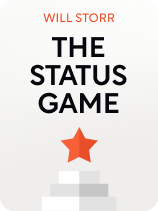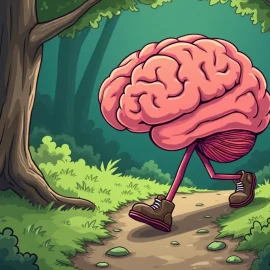

This article is an excerpt from the Shortform book guide to "The Status Game" by Will Storr. Shortform has the world's best summaries and analyses of books you should be reading.
Like this article? Sign up for a free trial here.
How important is status in society? What is a status game?
You might not think of yourself as a person who cares about status. Yet in The Status Game, Will Storr writes that not only are you constantly competing for status, but the need for status is wired into your brain.
Below we’ll discuss why people compete for status in society, and how it becomes a game in the first place.
What Is a Status Game?
The need for higher status in society might not be a flattering picture: We all see ourselves as the hero of our story, and we like to think that we’re defined by what we do, not by our need for others’ approval. But, Storr argues, the basic drive to gain status within our social groups is a product of how humans evolved as a species.
(Shortform note: Neuroscientists agree with Storr that our intense interest in status can be tracked in the brain. Researchers have found that our brains are so sensitive to information about social hierarchies that we can’t ignore cues about other people’s status, even when that information isn’t relevant to the task at hand. This suggests that status is hard-wired into the brain and strongly influences how we interact with other people.)
In this section of the guide, we’ll explore how Storr defines status and how the competition for status becomes a game. Then, we’ll outline the types of status games we play and the factors that determine which games we compete in throughout our lives.
What Is Status?
What do we mean when we talk about status? Storr explains that status involves more than being liked or accepted by a group. Instead, he defines status as feeling respected or admired by the people around you. When humans lived in itinerant hunter-gatherer bands, he says, we had an evolutionary motivation to join a social group because it conferred survival advantages. Conversely, a lack of social connection isolated us, leaving us feeling vulnerable and threatening our health and well-being.
(Shortform note: Storr’s definition of social status is consistent with those of other experts. Sociologists define status as the level of honor or prestige attached to our position in society. They explain that two kinds of social status determine our place in the social hierarchy: “achieved status,” which you gain through your own accomplishments, and “ascribed status,” which comes from your family’s social position and socioeconomic background, your sex, and your race. Both kinds of status help us achieve social connection, which, as Storr argues, is key to our survival. Indeed, the CDC reports that people with strong social bonds have a 50% increased likelihood of survival compared to those who have fewer connections with others.)
Status also gives you something over and above a survival advantage: It helps you find your place within your social group. Storr points out that humans don’t just want to belong to a social group. We also want to rise up the social hierarchy within that group.
(Shortform note: Storr’s observation that we want to both fit in with and stand out from our peers squares with what other experts have observed about our social behavior. In This Is Marketing, Seth Godin explains that some people tend to be driven by a desire for belonging and others by a desire for superiority. In this model, the need for belonging is about connecting with people whose opinion you value, while the need for superiority is about differentiating yourself and demonstrating your dominance in the social group. These two desires often coexist in the same person, and we balance them against each other when making decisions.)
How Does Status Become a Game?
The competitive nature of our pursuit of status isn’t the only reason that Storr calls it a game—a status game also has rules and symbols that draw us in and compel us to play along. Next, we’ll take a look at two things that need to happen for status to become a game: We come to rely on rules to structure the status game, and we accept status symbols as a means of assessing our performance in the game.
We Agree on Rules to Structure the Game
When humans band together in a social group, we naturally create stories, which take the form of cultural narratives, ideologies, religions, and systems of morality. These stories serve as rules you have to follow not only to gain acceptance within the group but also to seek the respect and admiration of others.
Storr explains that some of the rules within social groups are ancient and universal (like helping other group members or respecting a leader’s authority). But other rules are culturally specific, particular to their time and place.
Status Symbols Tell Us How We’re Performing
Your brain is wired to seek things that are valuable, including social connection and social status. According to Storr, these value judgments are linked to a “status detection system,” which figures out how you’re performing against other people by looking at status symbols: signals that have an agreed-upon meaning relevant to a person’s social standing.
An obvious status symbol might be the car someone drives or the shoes they wear. But material objects aren’t the only status symbols your brain uses to size up other people. Storr explains that your brain has learned to read social value in people’s appearance, behavior, voice, body language, and facial expressions. Your brain is extraordinarily attentive to these cues because it wants to know where others stand—and how you measure up against them.
When you join a group and accept the rules and symbols of the group’s status game, you naturally internalize its stories and values, meaning that you subconsciously experience your membership in the group as a game. You then play the game to keep gaining more status. This causes you to become invested in upholding the rules and symbols of the game, because your own status depends upon their continued relevance.
What Kinds of Status Games Do We Play?
What form do these status games take? Storr writes that we play three different kinds of status games:
- “Dominance games,” where the people who can exercise the strongest force or instill the most fear come out on top
- “Virtue games,” where the people who can demonstrate the deepest dedication to obeying moral rules or fulfilling their ethical duty gain status
- “Success games,” where the people who achieve extraordinary skill or knowledge ascend the hierarchy
Storr explains that virtue and success games, which he calls “prestige games,” differ from dominance games because they tap into distinct psychological processes. The drive for dominance is ancient, he says, and the evolutionarily newer desire to gain prestige by demonstrating virtue or success hasn’t overwritten that earlier instinct to gain influence by exerting force.
Most games aren’t “pure” games that fall into just one category. Storr writes that for thousands of years, humans have played virtue-dominance games, where people win status by embodying and enforcing the moral principles valued by the group. We might speculate, for example, that in a paleolithic hunter-gatherer band, a person might have gained status by enforcing the rules of a religious ritual or by assigning a punishment to a wrongdoer.
Storr writes that the success game is an evolutionarily newer kind of game than the dominance game. He traces Western cultures’ emphasis on individual success to the medieval breakdown of early Europe’s kin-based social systems into nuclear families. He says that when people began to seek status outside of their kin groups, they began playing success games: joining guilds, attending universities, moving to cities, and building knowledge in science, philosophy, and theology. Success games incentivized people to learn new ideas, and the pursuit of knowledge came with a new kind of prestige. This pushed innovation forward and fostered the development of the scientific method.
What Determines Which Games We Play?
Storr writes that a combination of factors—including the genes we inherit, the environment we experience in childhood, and the people we spend our time with—determines which status games we play throughout our lives.
He points out that developmental changes that take place in the adolescent brain increase our sensitivity to other people’s judgments. These changes motivate us to seek the reward of social approval (and to avoid the pain of social rejection). Around the same time in our lives, we’re initiated into our first status games: often a sports team, a religion, a fraternity or sorority if we go to college, or a military force if we enlist as young adults. As we learn to play our first status games, we learn how to signal our membership in the groups we play them with.
(Shortform note: Psychologist Mitch Prinstein, author of Popular, further explains that just prior to puberty, the brain changes in ways that make us feel more invested in our social relationships. The social status we achieve as adolescents affects what experts call our “social information processing” tendencies later: things like what we pay attention to in social situations, the extent to which we’re sensitive to rejection, and the likelihood that we’ll see social cues as threatening. This can have an effect on the social groups—or status games—we participate in as adults.)

———End of Preview———
Like what you just read? Read the rest of the world's best book summary and analysis of Will Storr's "The Status Game" at Shortform.
Here's what you'll find in our full The Status Game summary:
- How life is just a game of status and you're a player in it
- How the status game works and what you can do to avoid the toxicity
- What happens when the status games go wrong






